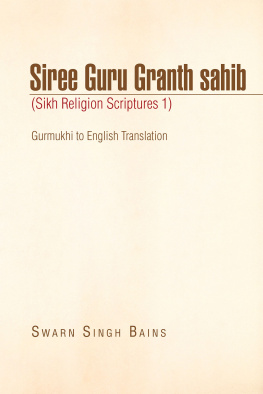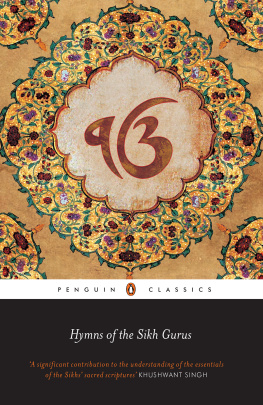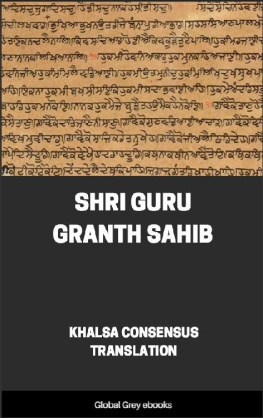Sukhmani Sahib - English Translation Manmohan Singh Sethi Published by Sukan Sethi, 2014.
While every precaution has been taken in the preparation of this book, the publisher assumes no responsibility for errors or omissions, or for damages resulting from the use of the information contained herein. SUKHMANI SAHIB - ENGLISH TRANSLATION First edition. October 11, 2014. Copyright 2014 Manmohan Singh Sethi. ISBN: 978-1502237149 Written by Manmohan Singh Sethi. 10 9 8 7 6 5 4 3 2 1
Waheguruji ka Khalsa,Waheguruji ki Fateh.Sukhmani Sahib English Translation
F oreword The word Sukhmani , when given an English meaning, can translate into several versions.
Some of the commonly preferred titles are, ' Gem of Peace' , 'Jewel of Peace' , 'Song of Peace' and 'Psalm of Peace' . Appearing on page 262 to page 296 of the Sri Guru Granth Sahib , the Sikh Holy Scriptures, it is a set of hymns divided into 24 sections. Each section consists of 8 hymns, known as Astpadi . Every hymn is preceded by a verse, known as Salok . So the format will start with a verse ( Salok ), followed by 8 hymns ( Astpadi ), which make up one section. The whole prayer comprises of 24 sections, just like 24 hours comprise a day.
The fifth Sikh Guru, Guru Arjan Dev Ji, compiled this set of 192 Hymns. His Holiness, Guru Arjan Dev Ji , never uses his name even once in the composition, opting instead to use the name Nanak , to refer and honor the first and founding Sikh Guru, Guru Nanak Dev Ji . I have used the word 'Name' in place of the Gurmukhi word 'Naam' for your easy understanding. Both denote the same meaning, which is 'The Name of God'. This book is only possible by divine inspiration and the Almighty's grace. The goal of this book is to give readers who don't understand Gurmukhi (the language in which the scriptures were written), a chance to understand how magnificent this lengthy composition is.
It takes about 60 to 90 minutes to recite the whole prayer. I will present a brief synopsis of the message each section intends to convey. Then I will present the entire 192 hymns. Please keep in mind that it is my humble attempt to explain the message of the divine, and I'm sure it will reveal more interesting and different angles to the reader once they have read it. Don't be surprised if every reading reveals something new. I wish the reader Happiness and may you attain peace of mind after reading this divine composition, and imbibe its teachings into your everyday life.
THANK YOU GOD B rief Synopsis of the 24 sections ( Astpadis )
- Sums up the benefits of meditation and contemplating on the Lord.
- Tells us that by being pious and practicing Holiness, we reduce our ability to sin.
- The Guru tells us that performing austerities or studying holy texts etc, cannot compare to reading or listening to the sacred Word of the Lord.
- Emphasizes the need for good morals and behavior.
- Teaches us gratitude and to thank God for all his gifts and blessings to us.
- Tells us of the different types of gifts and blessings that the Lord has bestowed on us.
- Discusses the attributes and characteristics of the Saints.
- Carries from the 7th section, it glorifies the virtues of the God-oriented man, the Brahm-giani.
- Guru Arjan Dev defines the various types of Holy Persons.
- This section deals with the various types of people and substances, both good and bad.
- Tells us that the humble and meek win God's Love, while the vain and egoistic one find no peace or joy.
- This section dwells on the people that are arrogant and boastful.
- Teaches us of the need to associate with the Saints and refrain from slandering them.
- Points to us that mortals cannot be relied on. They are volatile and unreliable.
- Tells us that just as darkness is dispelled by light, the Guru's teachings and instructions awakens the mind.
- The Guru points to us that the Supreme God is the Playwright, Director and Actor in his own plays.
- Here, the Guru emphasizes the unique qualities of a true servant of God, namely humility and obedience.
- This section stresses the characteristics of a true seeker of truth.
- Guru Ji warns us of the various distractions of life, such as amassing wealth and all impermanent things that we have to leave behind when we depart.
- This section tells us of the efforts we need to put for spiritual progress.
- Guru Ji tells us of the void that prevailed before the Lord created the World.
- While God's attributes are infinite, His Holiness points out a few, namely generosity and goodness.
- Reveals to us the omnipotence of God, who created the expanse of the Universe.
- The final section tells us of the benefits of Sukhmani. The true devotee will be blessed with positive attributes, namely health, wisdom and everlasting peace.
W ith the Lord's grace and blessings, I humbly present you the Holy Sukhmani Sahib in English. Begins with Salutation by Guru Arjan Dev Ji to the Supreme Lord, followed by the hymns. One Universal Creator God. Attained by the grace of the True Guru.
Salok I bow to God, who is the Creator of all. I bow to God, who existed even before the ages began. I bow to God, the True One. I bow to the Great, Divine God. Astpadi (Verse) 1 Meditate, Meditate in remembrance of Him, and obtain peace. Worry and Anguish shall be dispelled from you.
Remember and praise the One who pervades the whole Universe. Countless people, in various ways, chant his Name. The Vedas, Puranaas and Simritees (Ancient Holy Scriptures), Were created from the One Word, the Name of the Lord. That person, in whose heart and soul the One Lord dwells, Praises of such a person, cannot be recounted. Those devotees who yearn for the blessing to have one glance of You, O Lord, keep me in the company of such a person, and save me along with them. [1] S ukhmani: Peace of Mind; the Nectar of the Name of God.
The minds of the devotees abide in a joyful peace. Remembering God, one does not have to enter in the womb of reincarnation again. Remembering God, the fear of Death is dispelled. Remembering God, Death keeps a distance, Remembering God, one's enemies (the five evil vices Lust, Anger, Greed, Attachment, Pride) retreat. Remembering God, no obstacles are met. Remembering God, one remains aware and alert, night and day.
Remembering God, one is not touched by fear. Remembering God, one does not suffer. The remembrance of God is obtained in the society of the true devotees. O Nanak, all treasures and wealth are obtained by sincere devotion and Love for God. [2] By remembering God, one obtains spiritual and supernatural powers and the nine treasures. By remembering God, one obtains divine knowledge, meditation and the essence of wisdom.
Remembrance of God, is the true form of penances, devotion and worship. In the remembrance of God, duality is removed. By remembering God, one takes purifying baths at sacred shrines and places of pilgrimage. By remembering God, one attains the honor in the Court of the Lord. In the remembrance of God, one becomes a good person. By remembering God, one reaps the true fruit (true purpose of human life.
They alone remember Him in meditation, whom he inspires and blesses to meditate. Nanak touches the feet of such humble beings. [3] The remembrance of God is the highest and most exalted of all. In the remembrance of God, many are saved. In the remembrance of God, thirst (yearning and desires) are quenched. By remembering Him, all things are known (what is good, what is bad).
By remembering God, the fear of Death is removed. By remembering God, all hopes and desires are fulfilled (the devotee does not yearn anymore). By remembering God, the filth of the mind is washed off, And the Name of the Lord is absorbed into one's heart. God abides on the tongues of His Saints. Nanak wants to become the slave of slaves, of such true Saints. [4] Those who remember God are wealthy (in the true sense).













